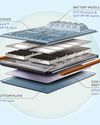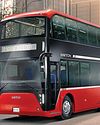
It was almost two decades ago that the system of High-Security Registration Plates (HSRP) was introduced for all vehicles by the Government of India (Gol) to help transform personal safety and national security. And yet little is known about it. So Autocar Professional decided to interview the second-generation dynamic entrepreneurs Rushang Shah, Promoter & Director, and Dhruv Patel, Director - who both lead Shimnit India Pvt. Ltd., the company that truly spearheaded the HSRP revolution in our country.
Excerpts from the interview:
When and why was the HSRP system introduced and mandated in our country by way of legislation?
RS: The HSRP system was first introduced by the Ministry of Road Transport and Highways (MORTH), GOI vide Notification dated 22nd August 2001. The order is called the 'Motor Vehicles (New High-Security Registration Plates) Order, 2001'. It came into force on 28th September 2001 for new vehicles and all old vehicles plying on the road had two years time from the date of publication of the official gazette to adopt the new HSRP regime. Subsequently, as per the notifications dated 4th and 6th December 2018 respectively, the 16th amendment to the Central Motor Vehicle Rules, 1989 was introduced whereby the vehicle manufacturers were to ensure that all new vehicles were sold fitted with HSRP. The new notification rules came into force for new vehicles from 1st April 2019.
The HSRP system was introduced to bring about a change in the license plate regime to obtain standardization of number plates. The idea was to create a national database of vehicles plying on the road and to exercise complete control over issuance of license plates to vehicle owners in the interest of checking crimes for personal safety and national security.
This story is from the {{IssueName}} edition of {{MagazineName}}.
Start your 7-day Magzter GOLD free trial to access thousands of curated premium stories, and 9,000+ magazines and newspapers.
Already a subscriber ? Sign In
This story is from the {{IssueName}} edition of {{MagazineName}}.
Start your 7-day Magzter GOLD free trial to access thousands of curated premium stories, and 9,000+ magazines and newspapers.
Already a subscriber? Sign In

Spain's Fersa Group invests in India-based Delux Bearings
Besides theRs100 croreinvestment, the Indian company gets access toadvanced technologies and bearings with arange of applications that willhelpinits global growth strategy, writes Manobhava Baruah.

Tata Autocomp to open compact dual-clutch transmission plant
Amidthe country’s growing need for personal mobility with easy manoeuvrability, comes the demand for vehicles with automatic transmission. Tata AutoCompisready tomovein writes Shruti Mishra.

Pankaj Munjal-backed Hero Motors raises equity from GEF Cap
The company willinvest Rs1,500 crore over thenextthree years andit expects 60 percent ofits turnover to come fromelectric vehicle parts. Itaims to becomea Global EV Solutions Company from India

New age thermoplastics for next-generation EV batteries
Saudi-based global materials major SABIChas developed cutting edgein fire-resistant polymers and flame-retardant materials that comply with various EV battery safety standards across the world.

Switch Mobility to meet growing e-bus demand with fresh capex
Oncourse for abillion-dollar business, the company is exploringa possibility of operating satellite factories across the country to serve different geographies, write ShahkarAbidi and Ketan Thakkar.

Kia India to invest Rs 2,000 crore in EVS, to introduce new e-RV in 2025
New investmentto drive R&D, infrastructure development and manufacturing capabilities. The company willlocally produce EVsin India with possibility of exports as well, writes Mayank Dhingra.

"The government has given enough time for indigenisation but the industry has not taken it seriously"
Amitabh Saran, Founder and CEO, Altigreen, shares his views on problems inthe EV industry and battery localisation solutions with Amit Vijay M.

TATA MOTORS SEES ONE INTWO CARS SOLDAS EVS BY 2030
The company aims to offer wider choices withnew EVs that may straddle a pricebracket of Rs20to 40lakhinthe coming years, writes Ketan Thakkar.

MG Motor India in expansion drive, to invest $100 million
The investment willbe usedtoramp up existing production capacity from1.2to1.4-15lakh units per annum atthe automaker's Halol plantin Gujarat, writes Ketan Thakkar.

"Technology and its multiplier effect are driving business transformations and customer experiences"
Technical Centre India is one of Continental’s largest research and development centres in the world, andasa Centre of Competence’ it also develops customised products for the BRIC countries.